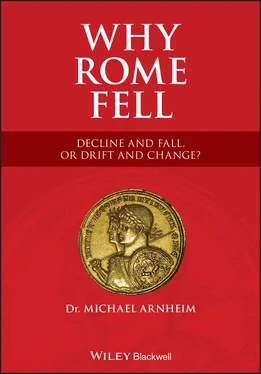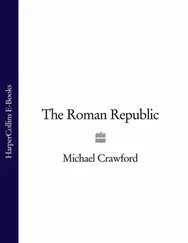Michael Arnheim - Why Rome Fell
Здесь есть возможность читать онлайн «Michael Arnheim - Why Rome Fell» — ознакомительный отрывок электронной книги совершенно бесплатно, а после прочтения отрывка купить полную версию. В некоторых случаях можно слушать аудио, скачать через торрент в формате fb2 и присутствует краткое содержание. Жанр: unrecognised, на английском языке. Описание произведения, (предисловие) а так же отзывы посетителей доступны на портале библиотеки ЛибКат.
- Название:Why Rome Fell
- Автор:
- Жанр:
- Год:неизвестен
- ISBN:нет данных
- Рейтинг книги:3 / 5. Голосов: 1
-
Избранное:Добавить в избранное
- Отзывы:
-
Ваша оценка:
- 60
- 1
- 2
- 3
- 4
- 5
Why Rome Fell: краткое содержание, описание и аннотация
Предлагаем к чтению аннотацию, описание, краткое содержание или предисловие (зависит от того, что написал сам автор книги «Why Rome Fell»). Если вы не нашли необходимую информацию о книге — напишите в комментариях, мы постараемся отыскать её.
Why Rome Fell: Decline and Fall, or Drift and Change?
Why Rome Fell
Why Rome Fell
Why Rome Fell — читать онлайн ознакомительный отрывок
Ниже представлен текст книги, разбитый по страницам. Система сохранения места последней прочитанной страницы, позволяет с удобством читать онлайн бесплатно книгу «Why Rome Fell», без необходимости каждый раз заново искать на чём Вы остановились. Поставьте закладку, и сможете в любой момент перейти на страницу, на которой закончили чтение.
Интервал:
Закладка:
The populace, however, were incensed at the murder of their idol as the assassins soon learned when an unruly crowd descended on their houses intent on burning them down. As part of his lifelong devotion to the popular cause, in his will, Caesar bequeathed to the Roman people his gardens near the Tiber, and left every Roman man 300 sesterces.
Caesar’s Heir
Probably the most significant provision of Caesar’s will was his adoption of his nineteen-year-old great-nephew, Gaius Octavius who also inherited three quarters of his substantial estate. But before he could take power, he had to emerge victorious from a two-stage civil war, first against the conspirators and then against his erstwhile fellow triumvir Mark Antony.
Emerging victorious in 31 BCE from the Battle of Actium against Antony, the young Caesar established a new form of government, which, with modifications, was to last for three centuries, with repercussions down to the present day. But what sort of government was this to be? There is a great deal of confusion among modern writers about the nature and even the name of this new form of government. In common parlance, Augustus is generally referred to as the first Roman “emperor,” and the system of government instituted by him as the “Roman Empire”. But this is neither clear nor accurate. See the discussion below.
Avoiding Julius Caesar’s Mistake
As an astute politician, Augustus took care not to make the same mistake that had cost Julius Caesar his life. Julius Caesar had ruled Rome as “dictator” for four years when he was appointed dictator perpetuo or dictator in perpetuum (literally, “dictator in perpetuity”, commonly translated as “dictator for life” but more accurately dictator for an indefinite period). Acceptance of this title signaled the end of the Roman Republic, which had lasted for 450 years under an elite to whom one-man rule was carefully eschewed except for brief emergencies. Julius Caesar’s position as dictator perpetuo posed a threat to this dominant minority, a number of whom, therefore, conspired to assassinate him on that fateful Ides of March, 44 BCE.
After his victory over Antony at Actium in 31 BCE, Augustus faced a serious dilemma. He was now master of the Roman world, but on what footing should his rule be placed? The title rex (king), which even Julius Caesar had refused, was anathema to the Republican aristocracy. But the title “dictator” was clearly also now off limits. The common people, who adulated Julius Caesar, had no objection to one-man rule, as was made clear in their outpouring of grief on Caesar’s assassination. Indeed, they wanted a strong leader to champion their cause. So the young Caesar’s game plan was to retain the support of the masses without offending the aristocracy, a daunting balancing act.
The Transmogrification of an Equestrian
The historic figure who is usually referred to as “Augustus” was born in 63 BCE into an equestrian family (i.e. the second rank, below that of senator). with the undistinguished name Gaius Octavius . In 44 BCE, on adoption in his great-uncle Julius Caesar’s will, he immediately took his adoptive father’s name: Gaius Julius Caesar . It was usual for an adoptive son to tack his own original nomen (name), in this case “Octavius,” on to his new name as an additional cognomen (surname), often in adjectival form, so: “Octavianus.” That is why he is generally referred to by modern historians during this period of his life as “Octavian”, but he is not known ever to have used the name “Octavianus” himself. To his contemporaries, he was known simply as “Caesar, ” and this was his greatest asset with the masses as it enabled him to capitalize on his adoptive father’s popularity. Moreover, besides having been a charismatic champion of the people, Julius Caesar was now a divinity, having been deified shortly after his death. So, in 42 BCE, the next step in Augustus’s transmogrification was to add Divi Filius (son of a god or son of the divine (Julius)) to his name, which now became: Gaius Julius Caesar Divi Filius . In 38 BCE, in a masterstroke, both his forename “Gaius” and his clan name ( nomen gentilicium ) “Julius” were ditched and replaced by Imperator (commander), the victory title by which a successful general was hailed by his troops on the field of battle. This gave him a new identity: Imperator Caesar Divi Filius . But the culmination of his reinvention of himself came in 27 BCE when he was accorded by the Senate the title Augustus (the Sublime or the Revered), a sobriquet associated with Romulus, Rome’s mythical founder. He then emerged in his full glory as Imperator Caesar Divi Filius Augustus .
Taking each component of this nomenclature separately:
Imperator: As Augustus tells us in his masterly autobiography, which came to be known as the Res Gestae Divi Augusti, he was hailed as imperator twenty-one times (RG §4). This was the traditional way in which a successful general was honoured by his troops on the field of battle. But, in a master stroke, he now adopted it as a forename. This designation, which came later to be used to mean emperor (and has given us the English word “emperor”), is the reason that the whole regime instituted by Augustus came to be known in English (and similarly in the Romance languages) as the Roman Empire. Because Roman emperors had never had the title of king, when Napoleon Bonaparte assumed monarchical powers he chose to call himself not king but emperor, which did not offend against his republican sensibilities as heir to the French Revolution.
Caesar: This is the only part of Augustus’s final designation that was an actual name: Julius Caesar’s cognomen. But it also became a title, later accorded to the emperor-designate and later still to a “junior” emperor, with the title Augustus reserved for “senior” emperors. It is the origin of the Russian imperial title Tsar or Czar and German Kaiser, and hence Kaiserzeit for the whole period ushered in by Augustus’s accession to power.
Divi Filius: Being the son of a god was no mean feat, but Julius Caesar was reputedly already of divine stock before his deification as a descendant of the goddess Venus Genetrix, whose image accordingly appears on coins issued by earlier members of the Julian gens (clan). The Julii traced their descent from Venus through Iulus, the son of Aeneas, the mythical Trojan prince who was an ancestor of Romulus, the eponymous legendary founder of Rome. It was partly to celebrate this tradition that Vergil wrote his Aeneid.
Augustus: This designation meaning “the Sublime one” or “the Revered one,” associated as it was with Romulus, gave the whole carefully crafted new self-image an aura of sanctity, and hinted at Augustus’s claim to be the second founder of Rome. Augustus himself was to be deified on his death as were most of his successors. The jovial Emperor Vespasian (r. 69–79) famously quipped on his deathbed, “Oh dear, I think I’m becoming a god.” (Suetonius, Vespasian, 23.4.) The deification of the emperor became the basis of the Imperial Cult, which was eventually extended to worship of the genius (attendant spirit) of the living emperor and, especially in the Eastern provinces, of the living emperor himself as well.
Augustus’s Autobiography ( Res Gestae Divi Augusti )
In his carefully crafted autobiography, Augustus managed to paint a composite picture of himself as a powerful populist leader and at the same time as the restorer of the republic in order to win the support of the plebs urbana (urban plebs) while conciliating the senatorial aristocracy at the same time. Here are a few choice extracts:
Читать дальшеИнтервал:
Закладка:
Похожие книги на «Why Rome Fell»
Представляем Вашему вниманию похожие книги на «Why Rome Fell» списком для выбора. Мы отобрали схожую по названию и смыслу литературу в надежде предоставить читателям больше вариантов отыскать новые, интересные, ещё непрочитанные произведения.
Обсуждение, отзывы о книге «Why Rome Fell» и просто собственные мнения читателей. Оставьте ваши комментарии, напишите, что Вы думаете о произведении, его смысле или главных героях. Укажите что конкретно понравилось, а что нет, и почему Вы так считаете.












